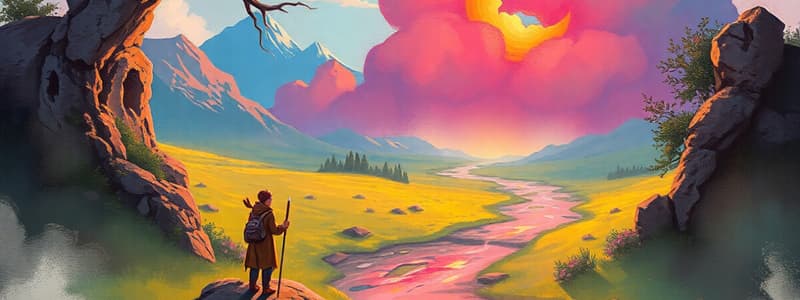Podcast
Questions and Answers
What defines a 'genre' in literature?
What defines a 'genre' in literature?
- A collection of essays and articles.
- A specific period in history.
- A type of writing characterized by particular styles. (correct)
- A form of narrative solely based on real events.
What distinguishes 'historical fiction' from other genres?
What distinguishes 'historical fiction' from other genres?
- The main character is always based on a real person.
- It portrays fictional characters and events in a historical setting. (correct)
- It only deals with crime and mystery themes.
- It includes real historical events and characters only.
Which of the following best describes 'fantasy' as a literary genre?
Which of the following best describes 'fantasy' as a literary genre?
- A story involving magical beings and impossible scenarios. (correct)
- A narrative based on real-life historical events.
- A factual recount of a person's life.
- A tale involving mystery and crime-solving.
What type of narrative is characterized by frightening events?
What type of narrative is characterized by frightening events?
Which literary genre includes stories that could realistically occur in everyday life?
Which literary genre includes stories that could realistically occur in everyday life?
What element is commonly found in folk tales?
What element is commonly found in folk tales?
In which genre would you likely find talking animals and moral lessons?
In which genre would you likely find talking animals and moral lessons?
What does 'science fiction' typically explore?
What does 'science fiction' typically explore?
What characteristic is commonly found in myths?
What characteristic is commonly found in myths?
Which statement best describes a folktale?
Which statement best describes a folktale?
What is a key difference between a biography and an autobiography?
What is a key difference between a biography and an autobiography?
What do informational texts primarily provide?
What do informational texts primarily provide?
Which of the following best describes a journal?
Which of the following best describes a journal?
What is a characteristic of fiction?
What is a characteristic of fiction?
Which of the following genres involves a magical world?
Which of the following genres involves a magical world?
What distinguishes historical fiction from other genres?
What distinguishes historical fiction from other genres?
Which genre explores life outside Earth and is often set in the future?
Which genre explores life outside Earth and is often set in the future?
What is a defining element of horror fiction?
What is a defining element of horror fiction?
What type of stories are considered realistic fiction?
What type of stories are considered realistic fiction?
What is the purpose of a fable?
What is the purpose of a fable?
What is a folktale primarily characterized by?
What is a folktale primarily characterized by?
What characterizes a folk tale?
What characterizes a folk tale?
Which of the following elements is NOT commonly found in myths?
Which of the following elements is NOT commonly found in myths?
What is the main purpose of legends?
What is the main purpose of legends?
Which statement accurately describes autobiographies?
Which statement accurately describes autobiographies?
What distinguishes informational writing from other types of writing?
What distinguishes informational writing from other types of writing?
Which aspect is NOT a common feature of fairy tales?
Which aspect is NOT a common feature of fairy tales?
What best describes a biography?
What best describes a biography?
Which feature is characteristic of a diary?
Which feature is characteristic of a diary?
Flashcards are hidden until you start studying
Study Notes
What is Literature?
- Written works considered of superior or long-lasting merit
- Published books and writings on specific subjects
- Leaflets and printed materials used for advertising or giving advice
Literary Genres
- A genre is a particular style or type of writing
- Fiction: Imaginative stories, often involving made-up people and events
- Fantasy: Stories set in magical worlds with fantastical elements (e.g., Harry Potter, Encantadia, Lord of the Rings)
- Historical Fiction: Stories with fictional characters and events set in a specific historical time period (e.g., Noli Me Tangere, Si Jhun-Jhun Noong Bago Ideklara Ang Batas Militar)
- Science Fiction: Stories exploring future technology, space travel, and otherworldly life (e.g., Star Wars)
- Horror & Mystery: Stories evoking fear and suspense (e.g., Shake, Rattle & Roll)
- Realistic Fiction: Stories that could realistically happen, with relatable characters and settings (e.g., Manila Noir, Deka 70)
- Fable: Short stories with animal characters that teach life lessons (e.g., Aesop's Fables)
- Folk Tale: Stories passed down orally, can involve animals, magic, and trickery (e.g., Indarapatra and Sulayman, Bian ni Lam-ang)
- Myth: Stories explaining the origins of the universe, often featuring gods and goddesses (e.g., Greek mythology)
- Legend: Stories passed down as truth, but often with exaggerated details (e.g., Alamat ng saging)
- Fairy Tale: Stories that often begin with "Once upon a time" or "Long time ago", containing magic and happy endings
- Non-Fiction: Accounts of real events and people
- Biography: True stories about someone's life (written in the third person - "he" or "she")
- Autobiography: Books written by people about their own lives (written in the first person - "I")
- Informational Writing: Texts that provide facts about various topics (e.g., sports, science, history, geography)
- Essay: Short pieces of writing expressing an author's viewpoint on a specific subject
- Speech: Formal addresses delivered to an audience
- Textbook: Books providing information on specific subjects
- Diary: Personal journals recording events and experiences
- Anecdote: Short, amusing stories about real events or people
Studying That Suits You
Use AI to generate personalized quizzes and flashcards to suit your learning preferences.




